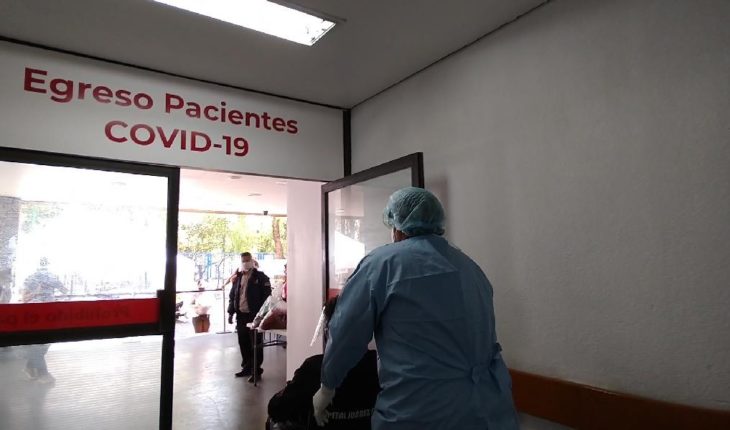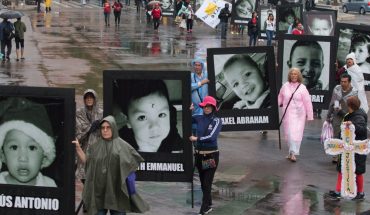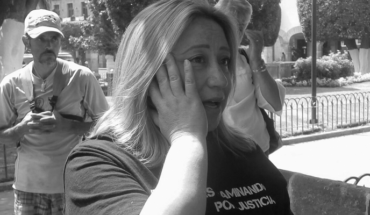Isolated in a hospital ward, next to a tubed patient, Román and two other men, suspected of having COVID-19, found in the talks and longing for good food the best way to pass hospitalization and get encouragement.
“We said, do it, imagine a pozole, a barbecue, some taquitos, a cold little coquita. That’s how we’d spend a while thinking about all that rich stuff. And we imagined eating it. Then, when the food came, we had to go down to reality and eat what they were taking us, which was not bad, but because it was the tasteless food of a hospital.”
Román says they ate it. “We knew we had to feed to be stronger and free it, we wanted to live and we wanted to make it want. Suddenly we did fall into depression and then we didn’t encourage each other.”
Read: “You take your mother’s body or the MP takes it”: funeral homes collapse by COVID-19
Separated from the family, with which they cannot have contact or by phone – at the Hospital Juarez in the CDMX, where he was admitted, they do not allow them to have it so that it does not become a vehicle of pollution – the patients have almost as the sole company the bed neighbors.
Doctors come in just for a while, in the morning and from the outside they’re on the lookout, Román says. It’s the nurses who visit them the most, to check their condition and give them the medicines. But most of the time they only see roommates.
“Lying down, with your pains and fever, you get lost in time, it seems that this one does not happen. I remember watching the clock, it was 5pm, I felt like I had a good time, saw it again and it was barely 5:05, so to have a better time, we started talking between the three roommates we could talk about.”
Life was counted in those days, jobs, families, routine. Román works at the Abastos Central, in a chili warehouse. He’s not sure, but he thinks he got the virus there.
Although the truth is, you don’t know if you really had COVID. Your test came back negative. “It was very rare because I had all the symptoms, very high fever, cough, when I got to the hospital I already had breathing problems, I was no longer oxygenating well, but twice I had the test and both times it came negative.”
Find out: Giving birth to COVID-19 times: midwives offer alternatives to hospitals
Because of the symptoms, Román was in a COVID area of the Juarez Hospital. He entered on Sunday, April 19 in the evening and no longer saw his family. He only knew about them when a doctor or nurse told him they had already been given the reports. “They’d tell me, uh, yes, down there’s your wife, we told her this, and that’s it, that’s all I knew.”
Román says he had two very bad days. “The fever didn’t go down, I had a headache, I couldn’t breathe well, and I started to despair, like I got depressed. That’s how it happened to us. We were cheering each other in the room, we were telling each other that we were going out, that we had to feel like it because the family was waiting for us outside, and that helped us a lot.”
It was until the sixth day of being hospitalized that Román began to improve. He gave up his fever, he started breathing better.
“Doctors say it helped me that I’m not that big, I’m 41 years old. But for a year now I’ve been diagnosed with diabetes, and I didn’t follow the diet much. I had soda, not a day, but yes. That affected me. If the risk conditions are greatly harmed, there in the room the patient who was intubated was 31 years old, but was obese, weighed more than 100 kilos.”
On the ninth day of being in the hospital Román was discharged. It came out this Monday, April 27. That same day there were other discharges at Juarez Hospital.
This Monday Román in a wheelchair and seven other patients were discharged from the Juarez Hospital.
In total, six men and two women from Mexico City and the State of Mexico joined the 74 patients who until this weekend also responded to the treatment, medications and care of the hospital’s specialists and were discharged.
Román is already home, but he must remain isolated. Although his result came back negative, because he was in a COVID room, he needs to follow quarantine for the protection of his family.
“I have to serve 20 more days locked in my room. I’m not going out at all. But I’m already home, with the food from home, my wife doesn’t have to go to the hospital every day for the reports. We’re all here. She and my three kids are fine. I’m happy to be recovered.”
Román does not forget to send a message, “You have to emphasize to people who do not assault medical personnel, in there, in the hospital, they are the ones who take care of us. I was treated very well. They were all very kind even though when they took care of us they put the property at risk. It is not fair for them to be mitreous, to be chlorine-gast, they save our lives.”
Of course, he doesn’t forget his roommates either. “We took the Face and the courses and for sure we will look later, when we are all better, they still stayed in the hospital, but they were better, later we will look ahead because that was the only thing that we had those companions and we will not forget.”
Relatives waited outside the COVID area, the departure of those on Monday received their high medical
What we do in Animal Político requires professional journalists, teamwork, dialogue with readers and something very important: independence. You can help us keep going. Be part of the team.
Subscribe to Animal Político, receive benefits and support free journalism #YoSoyAnimal.
translated from Spanish: Between bed neighbors we were encouraged to go out: COVID patient
May 1, 2020 |





